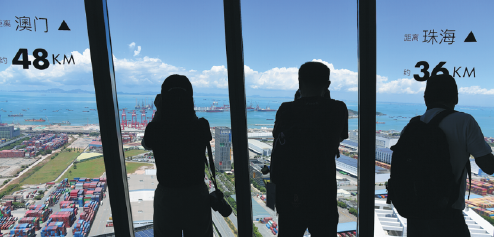'The most remarkable achievement of our times'
An influential British author assesses China and its drive over many years to create a prosperous society


Seeds of fascination
His interest in China began when he visited Guangdong on holiday in 1993 and saw the huge development taking place there as the country's reform and opening-up began to take place.
He was intrigued by the idea as to whether this was a new kind of modernity or a replica of Western development, the concept on which his later book was based, he says.
He moved to Hong Kong in the late 1990s with his wife Harinder "Hari" Veriah, a lawyer, who got a job there.
Jacques was devastated by her sudden death at the age of 33 in Hong Kong and has said When China Rules the World was inspired by her.
One of the major points of his book is that China's development should not be seen as purely an economic story, as it is often seen in the West.
He insists that becoming a moderately prosperous society has also been transformative of Chinese people themselves.
"You don't transform a country like this without the people themselves being transformed. If your living standards are being transformed-in fact, doubling every seven years-your whole life is changing and also at an extraordinary speed. It is a huge social and cultural transformation."
Jacques said that this transformation has made Chinese people innovative, which can be seen in the dynamism everywhere in society.
"This is one of the points I make in the book, that you have this mass innovation. And I don't mean by this just the people in the research and development laboratories of Alibaba, Tencent or Huawei, but society at large. China has become increasingly fertile ground for development."
Jacques is very supportive of President Xi Jinping's approach to tackling poverty.
Xi has made poverty eradication a personal mission since he was Party chief of Ningde, in Fujian province more than 30 years ago.
He has set out in his book Up and Out of Poverty and in other writings and speeches four important principles: avoiding a poverty mentality (if you believe you are poor, you will be); adopting development measures suitable to local conditions; strong leadership and coordination; and not wasting money on grandiose projects just because they may be popular.
"These are very relevant ideas," Jacques says. "It sums up the practical approach that has been followed. The Chinese have had a very intimate knowledge and grasp of what the problem of poverty is, and how to tackle it, and so they've gone about it in a very specific applied, incremental, pragmatic way."
It is difficult for China to be a blueprint for development for other countries because the country is so unique, although many in the developing world find it an inspiration, he says.
"One of the things that makes it unique is its sheer size. This has given it huge bargaining power with the West and the advanced world because they have wanted access to its market.
"You get all this nonsense now about the leaking of technology, but the only reason why foreign companies wanted to collaborate with Chinese ones is that they wanted to sell into this huge market."
Another advantage China has is that it has never been colonized, although it was subject to treaty port arrangements in the 19th century, he says.
"This has given the country a great sense of itself. You have this unbroken civilization going back millennia. Other developing countries don't have that. Africa was treated appallingly by the European colonizers, as was Latin America. These countries often have an identity crisis as a result, which often holds them back."
Jacques also believes China's contribution to human rights is not understood in the West because the concept is always associated with Western liberal democracy and individual rights.
"China is a Confucian society where the family and society at large is more important than any individual. One of the greatest human rights is the right not to be poor and not to go hungry. What China has achieved in pursuing a successful development strategy is a miracle really."
India gets a lot of credit in the West for being the world's largest democracy yet its citizens are some of the poorest in the world, he says.
"Poverty is so widespread in India. There are huge prejudices against women and health, and sanitation standards are awful. India is way behind China in human rights in any holistic sense. There really is no comparison."
However, Jacques believes the overriding reason why China has managed to become a moderately prosperous society is the strength of its governing system and leadership.
"You can see this now in the way that it is overcoming the coronavirus pandemic. China's leaders have been incredibly pragmatic and have as a result built a great society. They have asked themselves what the problems were and have set themselves goals and put in place policies to overcome them. It is the most remarkable achievement of our times."
- Authorities urged to prepare as cold wave hits Central China
- Explosion at Baotou steel plant kills 2, 5 missing
- Multiple injured rescued after factory explosion in China's Baotou
- Beijing activates emergency responses to ensure safety
- Beijing witnesses snowfall
- Tongji University's Wu Jiang assumes presidency of architects' Asia council




































